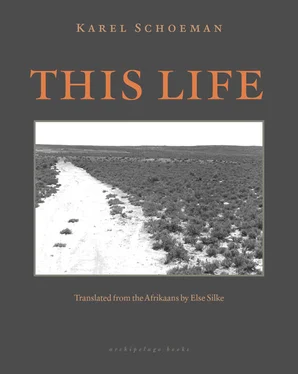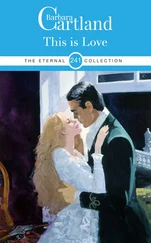On my way back to the light-filled windows and the music I kept close to the wall of the outbuilding to avoid the outspanned carts; I remember stumbling over a shaft and grabbing at the splashboard of a cart to keep my balance, and then hearing voices in the darkness of the shed where Coenraad slept, the deep voice of a man and a woman’s laughter. Why do I suddenly remember this as if it were important? The darkness and the music and the candlelit windows and I, stumbling and falling to my knees on the shaft, the edge of the splashboard smooth and even under my fingers. In the darkness something stirred, and someone came out and walked past the cart without noticing me, and stood for a moment, etched against the dim light coming from the house, a woman swiftly smoothing her hair, smoothing her dress, before crossing the yard to the house; and when she ducked her head under the lintel of the kitchen door, I saw by the glow of the candle on the kitchen table that it was Oom Thys Breedt’s young wife. This was a strange world in which I played no part, however, and it was not for me to wonder at what I had incidentally witnessed; I waited a while, motionless in the dark, but inside the shed all was quiet, and then I slipped across the yard and ducked my head as I crossed the kitchen threshhold. On the table the candle burnt motionlessly, and in her corner old Dulsie had fallen asleep.
It was late and some of the guests were getting ready to depart, but in the voorhuis they were still dancing. Mother looked up from her seat among the other women, straight-shouldered in her new black dress, and I knew that I had been right and that she had been looking for me. “I took Pieter some wine, Mammie,” I said; “All right, my child,” she answered with unaccustomed kindness in the presence of all these people who had come to celebrate her grandchild’s coming of age, and old Tant Mietjie Esterhuysen nodded approvingly and smiled where she sat beside her. “See if your father wants anything, my child,” she said in the same gentle tone, and I went out to where Father and a few other men sat smoking in front of the house. Old Oom Thys Breedt of Fisantkraal was among the group, in the midst of one of his long tales to which no one was listening any more, and Father just smiled at me, so that I turned to leave without noticing Oom Thys’s crutches propped against his chair, and stumbled over them. Where can his wife be? I suddenly wondered as I stooped to pick them up and put them back, and I returned to the house and searched in all the rooms, among all the faces in the flickering candlelight and the dust, until I found her sitting among the younger women, smoothing her hair with a swift gesture. Why did I want to find her? I no longer know, if ever I did; I only remember the straight, smooth edge of the splashboard under my fingers, and the way she sat there, smiling, among the younger women.
Why do I remember that evening of Maans’s coming of age in so much detail, young Jasper Esterhuysen and old Tant Mietjie and the darkness of Pieter’s room, Dulsie by the fire in the kitchen and the outspanned carts in the yard? Everyone is long dead, the evening forgotten, but I still remember it all while I can no longer say how Maans and Stienie’s wedding was celebrated, and all the New Year’s dances and birthdays and weddings of later years have been wiped out of my memory. That New Year’s Eve after Jakob brought Sofie to us as his bride, and the evening of Maans’s coming of age, with Helena Breedt ducking her head as she entered the house while I watched through the fine haze of candlelight and dust as she smilingly smoothed her hair, made me realise anew that I would never belong with these people or have any part in their lives.
The boisterous young men made Maans drink too much that evening so that, being unaccustomed to liquor, he was very sick and in the end had to be carried to the shed and laid down on Coenraad’s bed, for the house was filled with people. Where Coenraad was I do not know, for I did not see him that night. I stayed with Maans in case he should need anything, and I must have fallen asleep in the chair beside his bed, because I recall being awakened at daybreak by the sounds of vehicles being inspanned and the last guests departing; for a moment I was bewildered, and when I looked through the window I half-expected to see Gert and Jacomyn dancing together in the early dawn to the rhythm of the violin, but there was no one. I went out into the bright morning, and I saw the carts departing, and I knew I was safe again, safe at last.
That winter, just before people started leaving for their winter quarters, Jasper Esterhuysen rode over one more time with something old Tant Mietjie had sent Mother, and he stayed for lunch and lingered for a while. I did not say much to him but when he left, he took my hand in his own small, slack hand and said he hoped to see me in the Karoo that winter. No, I replied, we were not going to the Karoo this year because of Father’s ill health, Maans would be going alone with the sheep; and I gave it no further thought.
That year we got our own minister at last, and in the spring he was ordained. We went to town for the occasion, Father too, though he had to lie across the back seat of the cart, supported by pillows; perhaps he felt he could not be absent now, after we had been waiting for so many years, or perhaps it was only because the visiting clergy would be staying with us in town and he wanted to be there himself to welcome them. I still remember the consuming zeal with which Mother prepared for the reception of these important guests, and how the servants suffered, the sudden outbursts in the kitchen and the screaming and slamming of doors, the hurling of utensils, like in the years of my youth, long ago. When the guests began to arrive, none of this was evident, however, and long afterwards people still spoke of the way they had been entertained by us. I only remember those sudden outbursts in the kitchen, and Father being too ill to attend the services: the people had to come to him, and there was an endless stream of visitors to our home.
When it was all over and the excitement had abated, it became clear even to Mother that the end was near and that Father would not be able to return to the farm; but he went anyway. Maans was sent to the farm to fetch the wagon, and we loaded him on his mattress, and so he was carefully and painfully brought home, for he said he wanted to die in his own house on the farm, not in the strange new house in town, and this time Mother bowed her will to his in an unusual and uncharacteristic way. Thus he died in his own bed in his own room, in the bed where he was born, in the house built by his father, and Mother and I took turns to keep watch at his bedside. I cannot say I grieved for him, for his death was a release from the pain he had endured so patiently and for so long; but as I sat beside his bed one night, alone in the sleeping house with the tallow candle burning low in the candlestick, I suddenly realised he was the only person who had ever showed me any love or affection, except for Pieter long ago when I was young, and Sofie, and all that belonged to the past now. In the distance I heard an eagle owl hooting, and I experienced the same feeling as on that cold silvery morning when I stepped out of the outside room and saw the guests departing and leaving us behind, the feeling that something had ended for good.
We buried Father in the graveyard beyond the ridge, and Maans inherited the farm. It was during this time that diamonds were discovered in the interior, and shortly after the funeral Coenraad left for the diggings: I still recall that he left on foot the way he had come, with all his possessions in a grain-bag over his shoulder. There was great excitement about the diamonds, and after the funeral it was the main topic of conversation; Attie Keuler left for the diggings overnight with a few young men from the Fraserburg district, and Maans also spoke of going, but Mother made no reply when he mentioned the possibility one evening at supper, and in the end he stayed and continued on the farm. It was also during this time that old Oom Wessel, his other grandfather, died, and he inherited from him as well, money, as was said in later years, and farms in the Bokkeveld and the Ceres-Karoo, so that more responsibilities fell to him, and he had to go to Worcester several times to consult with the attorneys.
Читать дальше












